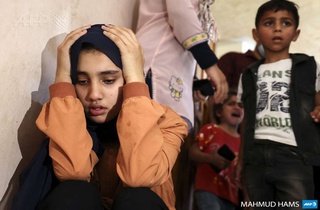In its last humanitarian situation report, UNICEF, the UN children’s fund, also said that between May 7 and July 31, Israel’s military and security forces killed nine Palestinian children and injured 556 others in the West Bank and east Jerusalem.
Those children in the West Bank and Jerusalem were attacked mostly with live ammunition, rubber-coated bullets, concussion grenades and tear gas.
At least 170 Palestinian children from east Jerusalem were arrested during the reporting period. The report made no mention of detained children in the West Bank.
UNICEF warned that it would not be able to resume its operations to support Palestinian children due to a severe budget shortfall for the current year.
“The 2021 UNICEF Humanitarian Appeal funding requirement is for US$ 46,202,701, of which US$ 11,205,521 was received during the reporting period, US$ 2,738,838 carried forward from 2020, and US$ 707,923 re-programmed from other resources to meet the urgent needs of the escalation of hostilities. 68 percent of the appeal remains as a funding gap,” the report explained.
The report pointed out that 116 private kindergartens, 140 public school buildings and 41 UNRWA school buildings sustained different levels of damage or destruction during the last war on Gaza.
It also said that “access to safe drinking water and sanitation remains a major daily struggle for much of the population.”
It explained that “the escalation of hostilities in the Gaza Strip resulted in the damage of 290 WASH (water, sanitation and hygiene) infrastructure, disruption of electricity supply. It increased access restrictions to critical WASH supplies undermining partners’ capacity to provide WASH services. Consequently, some 1.3 million people in the Gaza Strip alone do not have access to adequate safe drinking water, sanitation facilities, and hygiene items.”
“Health services in the Gaza Strip were also highly impacted by the May 2021 escalation, with 33 health facilities damaged during the conflict. The spread of COVID-19 has also continued for a second consecutive year aggravating existing vulnerabilities, affecting children’s well-being, and limiting boys’ and girls’ access to essential services. As of 31 July 2021, there were 345,702 confirmed cases of COVID-19, of which 50 percent were women and 12 percent were children under the age of 18.”
“In the Gaza Strip, limitations are still in place on supplies necessary for critical reconstruction, and basic livelihoods and services. As of the end of July, the Kerem Shalom (Karam Abu Salem) crossing into the Gaza Strip has been open only to enter specific essential items and limited humanitarian commodities.”
“Humanitarian access for supplies into the Gaza Strip remains a concern, with significantly decreased material availability in the local market.”
“There is an urgent need to import some materials, especially for WASH and other reconstruction projects impacted considerably by the recent hostilities. An additional challenge is the continued ban on the entry of “dual-use” materials into the Gaza Strip, which constrains the transfer of essential goods. This affects the operation and maintenance of vital water and sanitation facilities and infrastructure and the Gaza Strip’s only power plant. The lengthy importation process for supplies is also challenging the delivery of timely humanitarian assistance,” the UNICEF report elaborated. (ILKHA)



 Dünya
Dünya
 Dünya
Dünya
 Güncel
Güncel
 Güncel
Güncel
 Güncel
Güncel
 Güncel
Güncel
 Güncel
Güncel
 Dünya
Dünya
 Dünya
Dünya
 Güncel
Güncel





